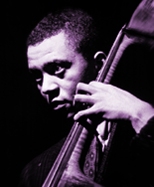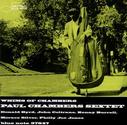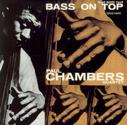 with Art Tatum on "Just One of Those Things" from December 20, 1952. (13 seconds; 53 KB)]
with Art Tatum on "Just One of Those Things" from December 20, 1952. (13 seconds; 53 KB)]

Perhaps the premier bop bassist, Paul Chambers actually started on baritone sax and tuba. He would go on to pioneer a bass approach termed as a lyrical bass style through the use of pitch inflection, microtones and inventive chromatic figures, and gained considerable attention for his improvisations both arco and pizzicato.
Another recognizable feature of Chambers' style is the extensive use of bowed solos reminiscent of Slam Stewart who would often hum along in octave unison. [Click here for a sample of Slam Stewart in action with Art Tatum on "Just One of Those Things" from December 20, 1952. (13 seconds; 53 KB)]
with Art Tatum on "Just One of Those Things" from December 20, 1952. (13 seconds; 53 KB)]
Born April 22, 1935 in Pittsburgh, Paul Laurence Dunbar Chambers Jr. was raised in Detroit with his father after the death of his mother. Picking up the bass at 13 he was receiving classical tuturing under a member of the Detroit Symphony Orchestra by 1952, but all the while keeping his ear open to the sounds of bebop coming from the East. He continued his musical studies with pianists Hugh Lawson and Barry Harris.
Starting with Kenny Burrell in 1949, Chambers gigged around with various small combos until joining up with Paul "Vice Pres" Quinichette in April 1954 and finally leaving Detroit. Over the course of the next year Chambers was heard in combos led by Benny Green, Joe Roland, J.J. Johnson and Kai Winding, and George Wallington.
But his biggest break, the tour of duty that would make his name, came in late 1955 when he joined the classic Miles Davis Quintet under the recommendation of Jackie McLean. He would play with Miles Davis until 1963, performing on the Davis' most memorable recordings such as Milestones and the classic Kind of Blue, holding his place in the lineup longer than any other Davis sideman (aside from '70's drummer Al Foster), and proving himself to be one the most versatile bassists of the era.

 During his tenure with Davis Chambers took on the distinction (rare for bassists) of recording some powerful sessions as leader. Perhaps the most important of these was Whims of Chambers (BN 1534) recorded September 21, 1956. This album is particularly noteworthy for its early work of fellow Davis sideman John Coltrane. Actually there are quite a few solos in the all-star sextet (which includes the bassist-leader, Coltrane, trumpeter Donald Byrd, guitarist Kenny Burrell, pianist Horace Silver and drummer Philly Joe Jones) and all of the players get their chances to shine on this fairly spontaneous hard bop set. Coltrane's two obscure compositions ("Nita" and "Just for the Love") are among the more memorable tunes and are worth reviving. "Tale of the Fingers features the quintet without Coltrane, the rhythm section stretches out on "Whims of Chambers" and "Tale of the Fingers" is a showcase for Chambers bowed bass. This is a fine effort and would be worth picking up by straightahead jazz fans even if John Coltrane had not participated.
During his tenure with Davis Chambers took on the distinction (rare for bassists) of recording some powerful sessions as leader. Perhaps the most important of these was Whims of Chambers (BN 1534) recorded September 21, 1956. This album is particularly noteworthy for its early work of fellow Davis sideman John Coltrane. Actually there are quite a few solos in the all-star sextet (which includes the bassist-leader, Coltrane, trumpeter Donald Byrd, guitarist Kenny Burrell, pianist Horace Silver and drummer Philly Joe Jones) and all of the players get their chances to shine on this fairly spontaneous hard bop set. Coltrane's two obscure compositions ("Nita" and "Just for the Love") are among the more memorable tunes and are worth reviving. "Tale of the Fingers features the quintet without Coltrane, the rhythm section stretches out on "Whims of Chambers" and "Tale of the Fingers" is a showcase for Chambers bowed bass. This is a fine effort and would be worth picking up by straightahead jazz fans even if John Coltrane had not participated.
Another Blue Note outting, sadly out of print, is Paul Chambers Quintet (BN 1564) recorded May 19, 1957. Here Chambers leads a group of rising stars including trumpeter Donald Byrd, tenor saxophonist Clifford Jordan, pianist Tommy Flanagan and drummer Elvin Jones on one of his earliest recording sessions on a program consisting of four originals by either the leader or Benny Golson plus a pair of standards; the CD also includes a previously unissued alternate version of "Four Strings" . Chambers is featured on "Softly as in a Morning Sunrise" while Byrd shines throughout.

 Bass on Top (BN 1569) from July 14, 1957 is unique for its total highlighting of rhythm through a quartet comprised of guitarist Kenny Burrell, pianist Hank Jones and drummer Art Taylor on a selection of standards, including "Yesterdays," "You'd Be So Nice to Come Home To" and "Dear Old Stockholm," as well as a handful of contemporary jazz numbers and originals. The atmosphere is relaxed and all those participating receive some due spotlight.
Bass on Top (BN 1569) from July 14, 1957 is unique for its total highlighting of rhythm through a quartet comprised of guitarist Kenny Burrell, pianist Hank Jones and drummer Art Taylor on a selection of standards, including "Yesterdays," "You'd Be So Nice to Come Home To" and "Dear Old Stockholm," as well as a handful of contemporary jazz numbers and originals. The atmosphere is relaxed and all those participating receive some due spotlight.
After leaving Davis Chambers teamed up with fellow Davis sidemen Jimmy Cobb (d) and Wynton Kelly (p) in the Wynton Kelly Trio (1963-66) recording a string of fine albums as well as freelancing until his death in 1969.